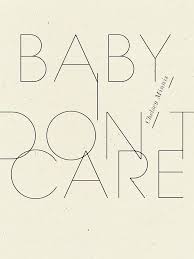
Reviews. Yesterday I mentioned how they can draw you in, make you want to click to cart on amazon dot glom, run to your local bookstore, or — if your biblio-habits are bankrupting you — enter a hold on your interlibrary loan system.
This happened with Chelsey Minnis’ new book Baby, I Don’t Care, which I could not secure due to all the holds. So I reserved instead Poemland, an older book with no holds. And no holds barred.
As a poet, it’s always interesting to read a wide swath of different voices and styles, and boy, howdy, is Minnis’ voice and style different. In Poemland, she elopes with the ellipsis. The exclamation point doesn’t scare her, either! And the single-space thing is for more conventional types. (Check the mirror, friends!)
Although the poems are not named, they are spread out between black divider pages, so I’ll take that construct as a “poem, ” Minis-style, and give you a sample from Poemland here. Have fun! (I think that’s the point, Jeeves.)
I want to sit very calmly with my bangs curled…
But my pet monster has bitten my hand!
Life makes me sad.
So sad that I walk down the street etc.
When I read poems I don’t like them…
But I like them like pouf-roses…
I like them like gilt saws…
And I like them like dark brown ram shearling!…
To enchant someone meaninglessly…
Is like getting insulted and kissed by your riding instructor…
This is when your hair sticks to your lipstick and it is so cuckoo…
You close the bedroom-dividing curtain…
Gold smudges…and a gemstone powered engine!…
A great devalued thing is a plain life…
But I like it like a venus-fly-trap pried open with tweezers…
I like to live a hard life but I know I shouldn’t do it…
I should live an easy life or I am a fool!
The sea-crabs try to cling onto anything.
The crab fishermen don’t even want all the crab…they want
money…
Even though their mustaches are covered with ice…
If you are a person you can also be someone’s goat…
I can tell you all about it for free…
I can long remember a nastie thing…
If it is well done..
This is a present of tiny pretty scissors…
Which you must use to cut your beast hair…
I am a vile baby…
Look, death, I have so much delicious vulture food within my
chest cavity…
I look to the left and right with my eyes and then I swing the sharp
thing…
As you rise out of a cloud on a mechanized contraption…
If you open your mouth to start to complain I will fill it with
whipped cream…
There is a floating sadness nearby…
Don’t try to walk away from a little girl like me!
This is a recollection of flopped happiness…
And it is a fistfight in the rain under a held umbrella…
There is a way to smoke your cigarette and look out the window
but you’ll never get enough of it.




